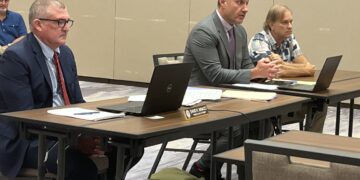A new Medicare program launched in July is offering vital relief to families caring for loved ones with dementia. After a yearlong pilot phase, the Guiding an Improved Dementia Experience, or GUIDE, program officially began its eight-year rollout, providing free respite care, 24/7 nursing support and personalized care navigation services to beneficiaries and their unpaid caregivers.
The GUIDE program is available in Lee and Collier counties through several health care providers, including Healthspan Partners of Southwest Florida and Right at Home Southwest Florida.

Dr. Adam Perry
Dr. Adam Perry, a geriatrician with Healthspan Partners in Naples, said his practice was part of the initial cohort launched by the Centers for Medicare and Medicaid Innovation in July 2024, one of 95 pilot programs throughout the country that will run for a total of eight years. More programs will be added over time, he said.
“The GUIDE program is a new approach to supporting people with dementia and their caregivers, focused on the concept that families should not be alone in navigating their dementia journey,” Perry said.
The cornerstone of the GUIDE program is care navigation — providing education, planning and resource coordination to unpaid caregivers, such as spouses or adult children. Participants receive access to a dedicated care navigator who helps them manage the often-overwhelming demands of dementia caregiving.
“Many times, each home that’s affected by dementia is trying to solve this on their own, and many of the challenges are common to the illness of dementia,” Perry said. “The idea here is that every family has someone to call, a care navigator, that can help them access resources and education resources to get more education and training if they wish.”
Perry said his practice is partnering with two area nonprofits, Dubin Center in Lee County and Alzheimer’s Support Network in Collier County, on aspects of care navigation.
A major component of the GUIDE program is its respite care benefit — up to 72 hours each year of free temporary care for the person with dementia, delivered either at home, at an adult day center or in a 24-hour facility. The goal is to give unpaid caregivers a much-needed break from their round-the-clock responsibilities.
The respite care benefit is an important one for families caring for someone with dementia, Perry said, since it can help provide some time off to those who are dealing with the minute-to-minute, day-to-day challenges of caring for an older adult with dementia.
“Medicare realizes that giving them some time to focus on whatever their needs are may be is best for the caregiver, but also best for the person with dementia,” he said. “Lower levels of caregiver strain or burden are associated with better outcomes for people with dementia.”
One of the organizations working with Healthspan Partners is Right at Home in Bonita Springs, providing in-home respite care to provide time off for caregivers, but not skilled nursing care.

Cassandra Kelly
Cassandra Kelly, director of business development for Right at Home, said caregivers can utilize the covered 72 hours per year of respite care however they see fit.
She used as an example someone who wanted to attend her granddaughter’s graduation but wouldn’t have someone to stay with her husband while she was gone.
“She wants to go to this, she has him signed up for this program [as a Medicare beneficiary], so she could call us and we would send a caregiver to stay with him while she goes to the graduation,” Kelly said. “That caregiver could help him with anything from showers, dressing, meal preparation or maybe even taking him out for lunch.”
Kelly said she thinks families facing the challenges of caring for someone with dementia will see a big difference when they are able to access this type of respite care, free of charge.
“It’s going to relieve so much financial burden, emotional stress and physical stress on the people who have been caring for their loved ones and can’t afford somebody to stay with them so that they can go out, get some outside time,” Kelly said. “It’s very hard to be the caregiver, so this is supposed to help with a lot of that.”
She said the GUIDE program could help caregivers with the ability to keep their loved ones in their own home longer, as well.
“Now they have a way to be able to get away every now and again, so it will help keep them healthier and able to take care of their loved one and keep them in their home as long as possible,” Kelly said. “So, that’s the goal: To keep them in their safe space at home as long as possible with their loved one or family member that’s been caring for them.”
Eligibility for the GUIDE program includes enrollment in traditional Medicare Parts A and B, not Medicare Advantage or PACE; have a confirmed diagnosis of dementia and not be in hospice care or a resident of a long-term nursing facility.





